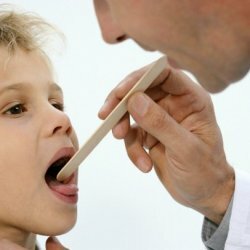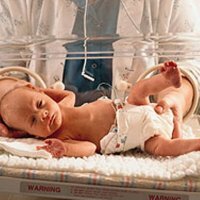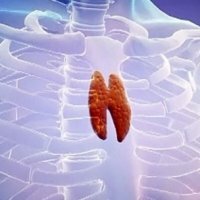Causes of enlarged lymph nodes in the child
 The aching child always makes parents worry. After all, the children's body is very weak and any cold or infectious disease is much more difficult to tolerate than in adults. In addition, the baby can sometimes be cured is not so simple. In this article we will tell you why the lymph nodes in a child can increase.
The aching child always makes parents worry. After all, the children's body is very weak and any cold or infectious disease is much more difficult to tolerate than in adults. In addition, the baby can sometimes be cured is not so simple. In this article we will tell you why the lymph nodes in a child can increase.
Lymph nodes often become inflamed with colds or with some childhood diseases, for example, chicken pox or mumps. These diseases are not dangerous and are easily cured. But, unfortunately, enlarged lymph nodes can also testify to more serious diseases. One such is lymphadenitis. Lymphadenitis occurs if the pathogenic flora has an effect on the baby's body. Lymph nodes are a barrier to our body, so lymphadenitis indicates the presence of the disease. Quite often, angina and laryngitis lead to an increase in lymph nodes.
Lymph nodes increase in size as follows. Once bacteria enter the lymph nodes through the lymph nodes, the latter, after receiving information that is transferred by immune cells, begin to produce cells that will fight the infection. At this time, and there is an increase in lymph nodes.
If the lymph nodes can not cope with a heavy load, then there is a lot of inflammation, which can lead to a purulent process. In this case, the skin will turn red and swelling will be visible. In some cases, inflammation is a secondary process, and in some cases it is primary. In the primary case, the infection penetrates immediately into the lymph nodes, bypassing the internal organs. This can happen because of the violation of the skin. Sometimes cat scratches lead to an increase in lymph nodes.
Most often in such cases, the disease begins to be expressed by a general decline in strength, as well as the appearance of pain in the area of affected lymph nodes. Often the child's body temperature rises and signs of general intoxication appear. In such situations, parents should immediately consult a doctor to provide first aid. Independently nothing to do. It is allowed to give only an antipyretic if the body temperature is above 39 degrees.
More often, various infections provoke inflammatory processes in the lymph nodes. However, there are cases when malignant tumors cause this symptom. If malignant formations are present in the child's body, the lymph nodes take on the role of "biological filters" that inhibit the spread of cancer cells throughout the body. That is why when removing malignant tumors and metastases, the lymph nodes adjacent to them are also removed. This helps reduce the risk of relapse. The same goes for leukemia - with this disease lymph nodes are irradiated.
In infants and toddlers up to three years of age, the lymphatic system is poorly formed. However, closer to five years it becomes strong and serves as a powerful barrier for infections. From five to seven years in children very often there is lymphadenitis and in about 70% of cases it passes into purulent lymphadenitis. Only in eight or nine years the child's organism acquires the ability to suppress infection in the lymph node itself and therefore their suppuration occurs much less often.
Lymph node enlargement in various diseases
We have already mentioned that lymph nodes increase with various infectious diseases, as well as with diseases of internal organs. For example, the occipital lymph nodes may increase in size for such diseases: rubella, toxoplasmosis, coronid rash, infectious mononucleosis.
These diseases are the most common. With toxoplasmosis, not only occipital, but also inguinal lymph nodes increase. At a rate of a lymph node can reach the size of a hazelnut, but at a palpation it will be soft and painless. They are very rarely suppressed and quickly restored to their former condition.
With infectious mononucleosis, almost all groups of lymph nodes increase, but the most pronounced process occurs in the occipital lymph nodes. They are visible even with the naked eye, the child often swells up his face and painful sensations are pronounced.
The same happens with rubella. Lymph nodes are inflamed and painful sensations occur when palpation. Almost never occurs suppuration, but lymphadenitis is a common phenomenon after rubella.
Inguinal lymph nodes can become inflamed as a result of damage to the skin on the legs. Very often inflammation occurs two to three weeks after injury. The infection enters the lymph node, but some time there is in the inactive state. Sometimes the body can cope with the infection itself and the swelling dissolves by itself. In some cases inguinal lymphonoduses are suppressed and the help of the surgeon is required. It is very important to pay attention to skin damage. If you treat them in time, you can avoid inflammation of the lymph nodes. Also, inflammation of the inguinal lymphonoduses can be caused by: the presence of boils in the buttocks, severe course of diaper dermatitis, after vaccination in the thigh or vaccination with BCG.
On the head, the lymph nodes may increase as a result of inflammation in the outer ear, with allergic dermatitis or with furunculosis of the scalp. In such cases, parotid lymph nodes may be inflamed. Also on the head, lymph nodes become inflamed with streptococcal angina, diphtheria, as well as with stomatitis and dental diseases.
Lymph nodes under the armpits can become inflamed as a result of damage to the skin on the arm. Most often the cause is "cat scratch disease".The disease is not dangerous, but requires treatment. After the cat scratches the baby, the lymph node that is closest to the scratch site becomes inflamed. If a scratch is to be immediately treated, the damaged area with hydrogen peroxide, zelenka or other antiseptic, and then monitor the condition of the baby. Sometimes axillary lymph nodes become inflamed due to toxoplasmosis.
In case of an inflamed lymph node, the child should immediately begin treatment. Consult a doctor, he can correctly determine the cause of the inflammation and prescribe the right treatment. If lymphadenitis started because of an infection, then antibiotics help well. Lymphonoduses quickly return to their former size, soreness and redness disappear. Sometimes parents, according to the advice of friends, begin to warm up the lymph nodes. But this in no case can not be done, as this can lead to infection and severe suppuration. Warming up can only be carried out according to the doctor's prescription and only in a medical institution.
It must be remembered that the inflamed lymph node indicates only a certain disease. Therefore, you need to treat the underlying disease. Sometimes for the correct diagnosis is not enough blood test and child complaints. In such cases, doctors prescribe an additional examination: ultrasound examination of the inflamed lymph node, as well as internal organs( abdominal lymph nodes, spleen, liver, etc.).If these data are not sufficient to make a diagnosis, the doctor will prescribe an X-ray study.



